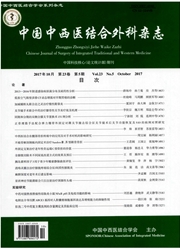

 中文摘要:
中文摘要:
目的:探讨凋亡抑制蛋白(Livin)和紧密连接蛋白-4(Claudin-4)在前列腺癌中的表达及其与前列腺癌中病理特征的相关性。方法:采用组织芯片技术,构建64点阵组织芯片,对71例前列腺癌和37例前列腺增生组织进行检测,免疫组化SP法检测Livin和Claudin-4蛋白的表达,并与前列腺癌的临床病理关系进行分析;Spearman等级相关法分析Livin和Claudin-4表达的相关性。结果:Livin蛋白和Claudin-4蛋白在前列腺增生组织中的阳性表达率明显低于前列腺癌组织(P〈0.01)。Livin在39例前列腺癌〈7分和≥7分的阳性表达率分别为56.41%(22/39)和81.25%(26/32),两者之间比较有差异;在Ⅰ-Ⅱ期和Ⅲ-Ⅳ期阳性表达率分别为56.10%(23/41)和83.33%(25/30),两者相比有明显差异。Claudin-4在〈7分和≥7分的阳性表达率为43.59%(17/39)和75.00%(24/32),两者之间比较有差异;在Ⅰ-Ⅱ期和Ⅲ-Ⅳ期阳性表达率分别为60.98%(25/41)和80.00%(24/30),两者比较有明显差异。Livin和Claudin-4蛋白表达状况Spearman相关分析显示呈正相关,相关系数r=0.87。结论:Livin和Claudin-4蛋白异常表达可能与了前列腺癌的发生、进展,联合检测可能提高前列腺癌患者的预后评估。
 英文摘要:
英文摘要:
Objective To explore the relationship of clinical pathological characteristics and expression of Livin and Claudin-4 protein in prostate cancers.Methods Tissue microarray technology was used for detect tissues for 71 cases with prostate cancer and 37 patients with benign prostatic hyperplasia.Total 64 paraffin microarray were arranged.Immunohistochemical SP method was used to detect expression of Livin and Claudin-4 protein in the chip.Relationship between expression of Livin and Claudin-4 and clinicopathologic features.Spearman rank correlation was used to assess the relationship between expression of Livin and Claudin-4.Results The positive expression rates of Livin and Claudin-4 in benign prostatic hyperplasia tissues were significantly lower than those in prostate cancer tissues(P〈0.01).The positive expression rates of Livin in prostate cancer tissues were 56.41%(22/39)(Gleason score〈7)and 81.25%(26/32)(Gleason score≥7).The positive expression rates of Livin were 56.10%(23/41)in stage I-II and 83.33%(25/30)in stageⅢ-Ⅳ,respectively.The positive expression rates of Claudin-4were in prostate cancer tissues were 43.59(17/39)for Gleason score〈7 and 75.00(24/32)for Gleason Score≥7.For stage I-II andⅢ-Ⅳ,the expression of Claudin-4 were 60.98%(25/41)and 80.00%(24/30),respectively.The expression of Livin and Claudin-4 was positively correlated by Spearman's rank correlation(r=0.87).Conclusion Abnormal expression of Livin and Claudin-4 protein may be involved in generation and development of prostate cancer.Combined detection can assess the prognosis of prostate cancer.
 同期刊论文项目
同期刊论文项目
 同项目期刊论文
同项目期刊论文
 期刊信息
期刊信息
